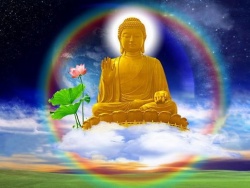Menngagde
In Tibetan Buddhism and Bön, Menngagde (Wylie: man ngag sde, Tib. མན་ངག་སྡེ; THDL phonetics: men-ngak-dé),
(Sanskrit: upadeshavarga), is the name of one of three scriptural and lineage divisions within Dzogchen, (Skt. Atiyoga, Great Perfection) teachings.
Dzogchen is itself the pinnacle of the ninefold division of practice according to the Nyingma school of Tibetan Buddhism.
Menngagde focuses on the knowledge of trekchö and the basis (gzhi).
Menngagde is also variously glossed as
"Secret oral instruction division", "Secret oral instruction series," "Secret oral school", or "Quintessential Instructions Series", or "The Category of Direct Transmission".
Practice
For general purposes, Menngagde may also be known as Nyingthik.
Germano & Gyatso (2000: p. 240) note a similarity of practice between Chan-like formless meditations and Nyingthik/Menngagde:
"...the Seminal Heart or Nyingthik (snying thig) form of the Great Perfection (rdzogs-chen) movement, ...a syncretic Tantric tradition consisting of Chan-like practices of formless meditation combined with exercises that cultivated spontaneous visions of buddhas."
Menngagde in the Dzogchen textual tradition
Traditionally, Mañjushrīmītra (Tib. 'jam dpal bshes gnyen) is said to have classified all the Dzogchen teachings transmitted by his teacher Prahevajra (Tib. Garab Dorje) into three series: Semde (Wylie: sems sde), Longde (Wylie: klong sde), and Menngagde.
Mañjushrīmītra’s student Shri simha re-edited the oral instruction class/cycle, and in this form the teaching was transmitted to Jñānasūtra and Vimalamitra.
Vimalamitra is said to have taken the Menngagde teachings to Tibet in the 8th Century.
The [http://www.rangjung.com/rootfiles/ryp-glossary.htm Glossary for Rangjung Yeshe books) (2004) described Menngagde as:
- The third of the Three Sections of Dzogchen, as arranged by Manjushrimitra.
In Tibet three lineages are represented: through Padmasambhava and Vairotsana who both received transmission from Shri Singha, and through Vimalamitra who received transmission partly from Shri Singha and partly from Jnanasutra.
The two former lineages were continued only as termas while Vimalamitra's was passed on both as terma and as oral transmission.
In the following millennium, innumerable termas have been revealed containing the precious instructions of these three great masters.
The most important of these terma treasures are included in the Rinchen Terdzo, a collection of termas by Jamgon Kongtrul covering the Three Inner Tantras and in Nyingtig Yabzhi.
The three series do not represent different schools of Dzogchen practice as much as different approaches.
As is common throughout much Buddhist literature, Tibetan Buddhism in particular, the divisions are sometimes said to represent gradations in the faculties of the students for whom the practices are appropriate; practitioners of low, middling, and high faculties, respectively.
Distinguishing Features of the Menngagde (Oral Instruction Series)
The distinguishing features of Menngagde are the practices of Lhündrub Tögal and Kadag Trekchö.
Tsoknyi Rinpoche explains:
- Within the instruction section there are two aspects: kadag trekchö, the cutting through of primordial purity, and lhündrub tögal, the direct crossing of spontaneous presence.
Another feature of the Menngagde is the sadhana of the "Seven Mind Trainings" (Lojong dön dünma, Wylie: blo-sbyong don-bdun-ma) Capriles (2003: p. 103) identifies the sadhana of the 'Seven Lojong' (Wylie: blo-sbyong don-bdun-ma).
As Buddhist scholar Elias Capriles, notes,
- In the cycle of Dzogchen Nyingthik teachings, there is a series of successive reflections called “the seven mind trainings” or seven lojong, the effect of which is similar to the one attributed to the “four reflections:” that of causing one’s mind to become integrated with the meaning of the teaching.
Four divisions of Menngagde
Menngagde itself is sometimes said to have been further divided by Sri Singha into four categories, called the "Four Cycles of Nyingtig" (Wylie: snying thig skor bzhi).
They are the:
Variations of the name of the fourth section include the
Secret Heart Essence (gsang ba snying thig), the Most Secret Unexcelled Nyingtig (yang gsang bla na med pa snying tig), the Innermost Unexcelled Cycle of Nyingtig (yang gsang bla na med pa'i snying thig skor), the Most Secret and Unexcelled Great Perfection (yang gsang bla na med pa rdzogs pa chen po), the Most Secret Heart Essence (yang gsang snying thig), the Most Secret Unsurpassable Cycle (yang gsang bla na med pa'i sde) and the Vajra Heart Essence.
Seventeen tantras
This fourth section of Menngagde is said to contain Seventeen Tantras, although there are eighteen when the Ngagsung Tromay Tantra (focused on protective rites of Ekajati) is added; and nineteen including the Longsel Barwey Tantra (Tantra of the Blazing Space of Luminosity.
- 'Self-existing Perfection (rdzogs pa rang byung) Self-existing Perfection' རྫོགས་པ་རང་བྱུང rdzogs pa rang byung
- 'Without Letters (yi ge med pa) Without Letters' ཡི་གེ་མེད་པ yi ge med pa
- 'Self-arising Primordial Awareness (rig pa rang shar) Self-arising Primordial Awareness' རིག་པ་རང་ཤར rig pa rang shar)]
- 'Self-liberated Primordial Awareness (rig pa rang grol) Self-liberated Primordial Awareness' རིག་པ་རང་གྲོལ rig pa rang grol
- 'Piled Gems (rin po che spung ba) Piled Gems' རིན་པོ་ཆེ་སྤུང་བ rin po che spung ba
- 'Shining Relics of Enlightened Body' སྐུ་གདུང་འབར་བ sku gdung 'bar ba
- 'Reverberation of Sound' སྒྲ་ཐལ་འགྱུར sgra thal 'gyur
- 'Great Auspicious Beauty (bkra shis mdzes ldan) Great Auspicious Beauty' བཀྲ་ཤིས་མཛེས་ལྡན bkra shis mdzes ldan
- 'The Mirror of the Heart of Vajrasattva' རྡོ་རྗེ་སེམས་དཔའ་སྙིང་གི་མེ་ལོང rdo rje sems dpa' snying gi me long
- 'The Mirror of the Mind of Samantabhadra (kun tu bzang po thugs kyi me long) The Mirror of the Mind of Samantabhadra' ཀུན་ཏུ་བཟང་པོ་ཐུགས་ཀྱི་མེ་ལོང kun tu bzang po thugs kyi me long
- 'Direct Introduction (ngo sprod spras pa)|Direct Introduction]]' ངོ་སྤྲོད་སྤྲས་པ ngo sprod spras pa)
- 'Necklace of Precious Pearls (mu tig rin po che'i phreng ba Necklace of Precious Pearls' མུ་ཏིག་རིན་པོ་ཆེའི་ཕྲེང་བ tig rin po che'i phreng ba
- 'Sixfold Expanse of Samantabhadra (kun tu bzang po klong drug) Sixfold Expanse of Samantabhadra' ཀུན་ཏུ་བཟང་པོ་ཀློང་དྲུག kun tu bzang po klong drug
- 'Blazing Lamp (sgron ma 'bar ba) Blazing Lamp' ( སྒྲོན་མ་འབར་བ sgron ma 'bar ba
- 'Union of the Sun and Moon' ཉི་ཟླ་ཁ་སྦྱོར nyi zla kha sbyor
- 'Lion's Perfect Expressive Power (seng ge rtsal rdzogs) Lion's Perfect Expressive Power' སེང་གེ་རྩལ་རྫོགས seng ge rtsal rdzogs
- 'Array of Jewels (nor bu phra bkod) Array of Jewels' ནོར་བུ་ཕྲ་བཀོད nor bu phra bkod

